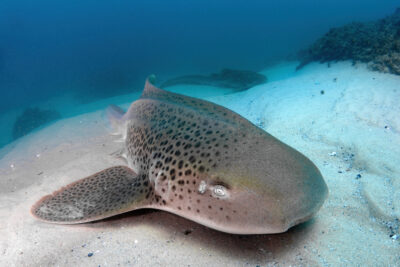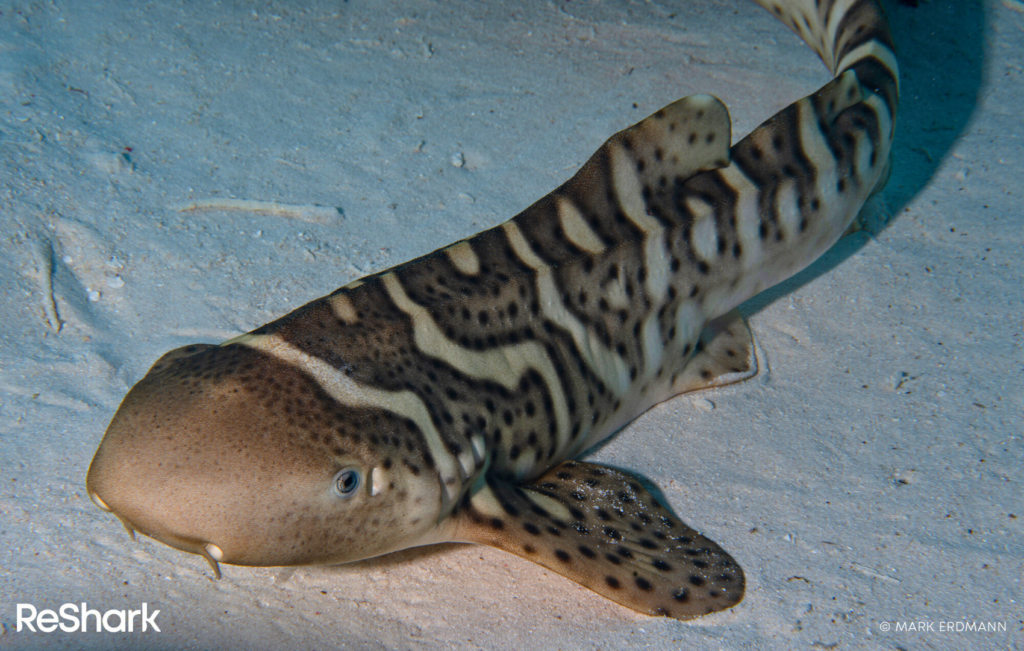
Leopard sharks are disappearing from Thailand’s waters, but the public has a unique opportunity to help save them. This spring, WildAid and Ocean Blue Tree joined forces to restart the “Spot the Leopard Shark – Thailand” program, which invites the local diving community, including operators, instructors, and divers, to contribute photos of leopard sharks (Stegostoma tigrinum) taken in Thai waters to identify individuals and assess population trends, behavior, and key habitats. This data will then be analyzed to guide future conservation efforts.
“Spot the Leopard Shark – Thailand” is a citizen science project that was first launched in 2013 at Koh Phi Phi Island, Thailand, as a collaboration between Dr. Christine Dudgeon, University of Queensland, Australia and Dr. Kongkiat Kitiwattanawong, Phuket Marine Biological Centre, Thailand’s Department of Marine and Coastal Resources. During the initial phase, the project used the collected photos to identify 230 individuals from the west coast of Thailand and started the process of gauging the country’s leopard shark population. Unfortunately, the project came to a pause in 2019 due to the Covid-19 pandemic.
The revived program project was soft-launched in May of this year at the Thailand Dive Expo (TDEX) to acquaint the larger diving community with the project, including guidance on taking photos that will help with scientific identification and raising awareness about the threats facing leopard sharks. Divers were invited to submit their leopard shark photos via the project’s Google form. The event successfully met our goal of collecting over 90 photos and videos of leopard sharks.
“Spot the leopard shark – Thailand” is the citizen science arm of the “Stegostoma tigrinum Augmentation and Recovery” or “StAR Project- Thailand”, an initiative founded by ReShark, an international collective dedicated to the recovery of threatened sharks and rays around the world by re-establishing healthy, genetically diverse, and self-sustaining populations. WildAid and Ocean Blue Tree are proud to be the implementing partner for the “StAR Project – Thailand,” contributing to the initiative’s research and helping to build a network of stakeholders to ensure the long-term recovery of leopard sharks across Thailand.


“Leopard sharks are crucial to the marine ecosystem, but they are becoming increasingly rare, despite the country being one of the key habitats for leopard sharks. They are often caught as bycatch because they inhabit coral reefs or sandy bottoms, which causes them to get caught in fishing gear.” said Metavee Chuangcharoendee, Project Manager of “StAR Project- Thailand.” She expressed concern over the significantly declining population in Thailand over the last 20 years and emphasized the importance of continuing “Spot the leopard shark – Thailand” for leopard shark conservation during her talk at the TDEX Diver’s Talk event.
Moving forward, we plan to expand outreach and recruit potential partners to enhance our collection of leopard shark photos. Promotional materials, including a brochure, handbook, and flyers will be distributed to dive schools, dive shops, and diving boat operators in preparation for the upcoming dive season in Thailand, which starts this month. Our goal is to gather as many leopard shark photos in Thai waters as possible, determine the number of identifiable sharks, and promote/educate on social media to build momentum amongst the public to conserve the species. We accept submissions of both recent and older photos to support our research and raise awareness.
Currently, the leopard shark is classified as Endangered (EN) on the IUCN Red List and is currently in the process of being listed as a protected species in Thailand. These sharks typically inhabit rocky areas and coral reefs. When coral reefs deteriorate, the leopard shark’s food supply also diminishes. This coupled with the loss of their habitat has led to the disappearance of leopard sharks from reefs. Building a database of leopard shark sightings through citizen science participation will culminate in identifying population trends and key habitats that are crucial to planning future conservation measures and restoring the population for this species.
Every diver can play an important role in this citizen science initiative to conserve leopard sharks and their habitats for future generations.
You may visit the website or download our handbook here to learn more about leopard sharks and how to properly identify individuals.
Stay in touch and get the latest WildAid updates.
SIGN UP